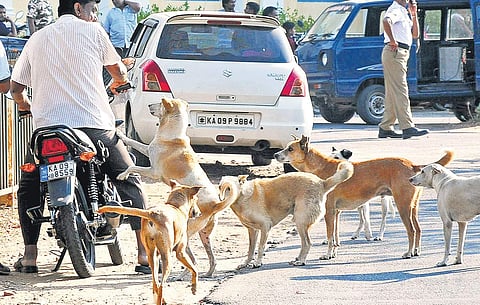Killer stray dog menace looms large in Bengaluru
BENGALURU: Deaths of two children in horrendous stray dog attacks in separate incidents in a matter of just four days has raised doubts on the efficacy of the Bruhat Bengaluru Mahanagara Palike’s (BBMP) Animal Birth Control (ABC) programme, as well as fears of such fatal attacks becoming more frequent in the days to come.
While the BBMP is certain that the stray dog population in the city has not increased and is rooting for the efficiency of the ABC programme, animal lovers and activists are certain it is burgeoning beyond control.
The latter are sure as they have observed packs of at least six-seven stray dogs every 500 metres in the city. However, there is no backing for the BBMP’s claims that the canine population is under control as the last dog census was conducted only in 2012, and there is not way for the civic body to determine what the stray canine population is at present.
Animal activists cite inefficient ABC programmes, preference for exotic breeds and abandonment of pet dogs for the rising number of strays. They explain that as dogs nurture strong territorial instincts, a rapidly growing population also makes them more aggressive and possessive about their territory as well as food strewn around, and passersby become targets of their aggression.
The 2012 census of livestock states that there are 1.83 lakh strays and 1.43 lakh pet dogs, a total of 3.27 lakh dogs in the city.
Although the Department of Animal Husbandry and Veterinary Services, government of Karnataka, is supposed to conduct a census every five years, no census has been done since 2012. But the officials say the census will commence next month.
Animal welfare activists say the reason for the increase in the number of stray dogs is 'failure of ABC programmes'.
Harini Raghavan, CXO search consultant, says trained and compassionate vets need to be in place. "One or two ABC partners have no prior experience in ABC surgeries and have only operated on live stock...how is this safe or viable? While the ABC programme is primarily built for the safety of human beings, it's time BBMP recognised that the dog is a very important stakeholder in the process. There are about six lakh dogs and only 30,000 are spayed every year. Once they are neutered, they are sometimes not relocated to the same locality," she adds.
Poor Solid Waste Management Blamed
While iterating that dog bite cases have reduced, Dr Maheshwar Gowda, additional director, Department of Animal Husbandry and Veterinary Services, says that the major reason for increase in stray canine populations is improper solid waste management. "Dogs proliferate in areas where there is no proper solid waste management. ABC programmes should also be more proficient. There might be, say, 10 dogs in an area, and when you go to catch them, two might run away smelling the nets. In a year, they'll then give birth to 10 puppies. Hence, the population increases," he says, adding that citizens who would like to help can also get their own community dogs and get them neutered.
Irresponsible Care, Skewed Preferences
Debadrita Jadhav, from Precious Paws Foundation, says abandonment of pet dogs is also a major issue. Many do not realise the responsibility of having a pet, she says, and hence, they abandon the dogs in two days to one week. "Several live with their parents or grandparents, and they do not approve of getting the pet neutered. Once the dog gives birth, they find it difficult to take care of five-six puppies and abandon them," she says.
Debadrita also points to apartment associations' refusal to permit residents from keeping dogs at home despite the High Court allowing pets to be kept at home. This, compounded by people’s preference for exotic dog breeds instead of Indian breeds, ensures the latter land up on streets.
There are many, even in the animal welfare circles, who have exotic breed dogs, she says. "They are mostly rescued and adopted by these people, but these are all breed dogs. They say it's their 'personal choice', but they should set an example by keeping an Indie at home." Though community feeding does help, many do it only to 'show off', say animal lovers. Karthik Sunder, an animal lover, says, "It’s just fashion these days. If every dog-loving individual adopts an Indie dog, it would ensure canine birth control, and we will never find strays as you see them today."
Census Next Month
Dr Maheshwar Gowda, additional director, Department of Animal Husbandry & Veterinary Services, says, "We will start the programme from next month. There was a delay due to some issues like elections and natural disasters. The central government coordinates with all state governments and then the programme is commenced."
BBMP Defends
BBMP denies malpractice or increase in the number of stray dogs in the city. Dr G Anand, joint director, Animal Husbandry Department, says since the ABC programme has been happening in the city, the numbers must have decreased.
Related Article
Bangalore University students, staff blame BBMP for stray dog menace on campus
11-year-old boy mauled by dogs dies in Bengaluru hospital
Running into lake allowed dogs to maul Praveen: Kin
Dog bite case: Two palike officials, contractor held for negligence
10-yr-old boy injured after pack of dogs attack him

